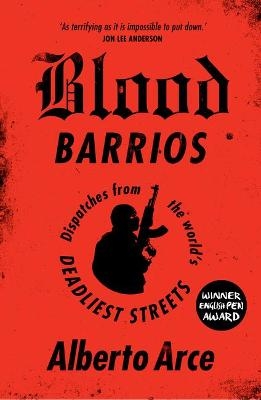
Blood Barrios
Zed Books Ltd (Verlag)
978-1-78699-049-5 (ISBN)
Winner of the 2018 PEN Translates Award for Non-Fiction
Features illustrations by the Honduran artist Germán Andino
Welcome to a country that has a higher casualty rate than Iraq. Wander streets considered the deadliest in the world. Wake up each morning to another batch of corpses – sometimes bound, often mutilated – lining the roads; to the screeching blue light of police sirens and the huddles of ‘red journalists’ who make a living chasing after the bloodshed. But Honduras is no warzone. Not officially, anyway.
Ignored by the outside world, this Central American country is ravaged by ultra-violent drug cartels and an equally ruthless, militarised law force. Corruption is rife and the justice system is woefully ineffective. Prisons are full to bursting and barrios are flooded with drugs from South America en route to the US. Cursed by geography, the people are trapped here, caught in a system of poverty and cruelty with no means of escape.
For many years, award-winning journalist Alberto Arce was the only foreign correspondent in Tegucigalpa, Honduras’s beleaguered capital, and he witnessed first-hand the country’s descent into anarchy. Here, he shares his experiences in a series of gripping and atmospheric dispatches: from earnest conversations with narcos, taxi drivers and soldiers, to exposés of state corruption and harrowing accounts of the aftermath of violence. Provocative, revelatory and at time heart-rending, Blood Barrios shines a light on the suffering and stoicism of the Honduran people, and asks the international community if there is more that they can do.
Alberto Arce, joined the Associated Press (AP) in February 2012 as a correspondent in Honduras, where for several years he was the only foreign correspondent to report from Tegucigalpa. He later joined AP's Mexico City bureau and The New York Times. He is a 2018 Knight Wallace fellow at the University of Michigan. He won the 2012 Rory Peck award for features his coverage of the battle for Misrata during the Libyan civil war and several other awards in the United Sates for his coverage in Latin America and has also reported from Lebanon, Iraq, Afghanistan, Iran, Venezuela, Gaza or Syria. This is his second book. He has also published Misrata Calling (2012). John Washington is a journalist, novelist, and translator. Daniela Ugaz is a translator and law student at New York University. They translated The Beast: Riding the Rails and Dodging Narcos on the Migrant Trail, by Óscar Martínez
Map: Routes of cocaine and violence in Honduras
Part I: Red Journalism
1. Inside the Volcano
2. Crime beat Rookie
3. Night of the Chepos
4. Death of a Taxi Driver
5. Four Boards Strapped to the Back
Part II: The Curse of Geography
6. A Little Known War
7. Mosquito Coast
Part III: Houses, Coffins, and Graffiti
8. Refugee Camp
9. One Coffin, One Vote
10. Hallucinations
11. Night of the Fire
Part IV: The Police
12. An Assassin
13. Death Squads
14. Police Reform
15. El Tigre Bonilla, A Culture of Simulacrum
Part V: Storytellers
16. Journalists
17. The Politicians
18. Those Who Imagine
Epilogue: What Am I Doing in Honduras?
| Erscheinungsdatum | 12.02.2018 |
|---|---|
| Übersetzer | John Washington, Daniela Ugaz |
| Zusatzinfo | Halftones, black and white 17 ; Maps 1 |
| Sprache | englisch |
| Maße | 129 x 198 mm |
| Gewicht | 274 g |
| Themenwelt | Literatur ► Essays / Feuilleton |
| Geisteswissenschaften ► Geschichte ► Regional- / Ländergeschichte | |
| Recht / Steuern ► Strafrecht ► Kriminologie | |
| Sozialwissenschaften ► Soziologie | |
| ISBN-10 | 1-78699-049-0 / 1786990490 |
| ISBN-13 | 978-1-78699-049-5 / 9781786990495 |
| Zustand | Neuware |
| Informationen gemäß Produktsicherheitsverordnung (GPSR) | |
| Haben Sie eine Frage zum Produkt? |


